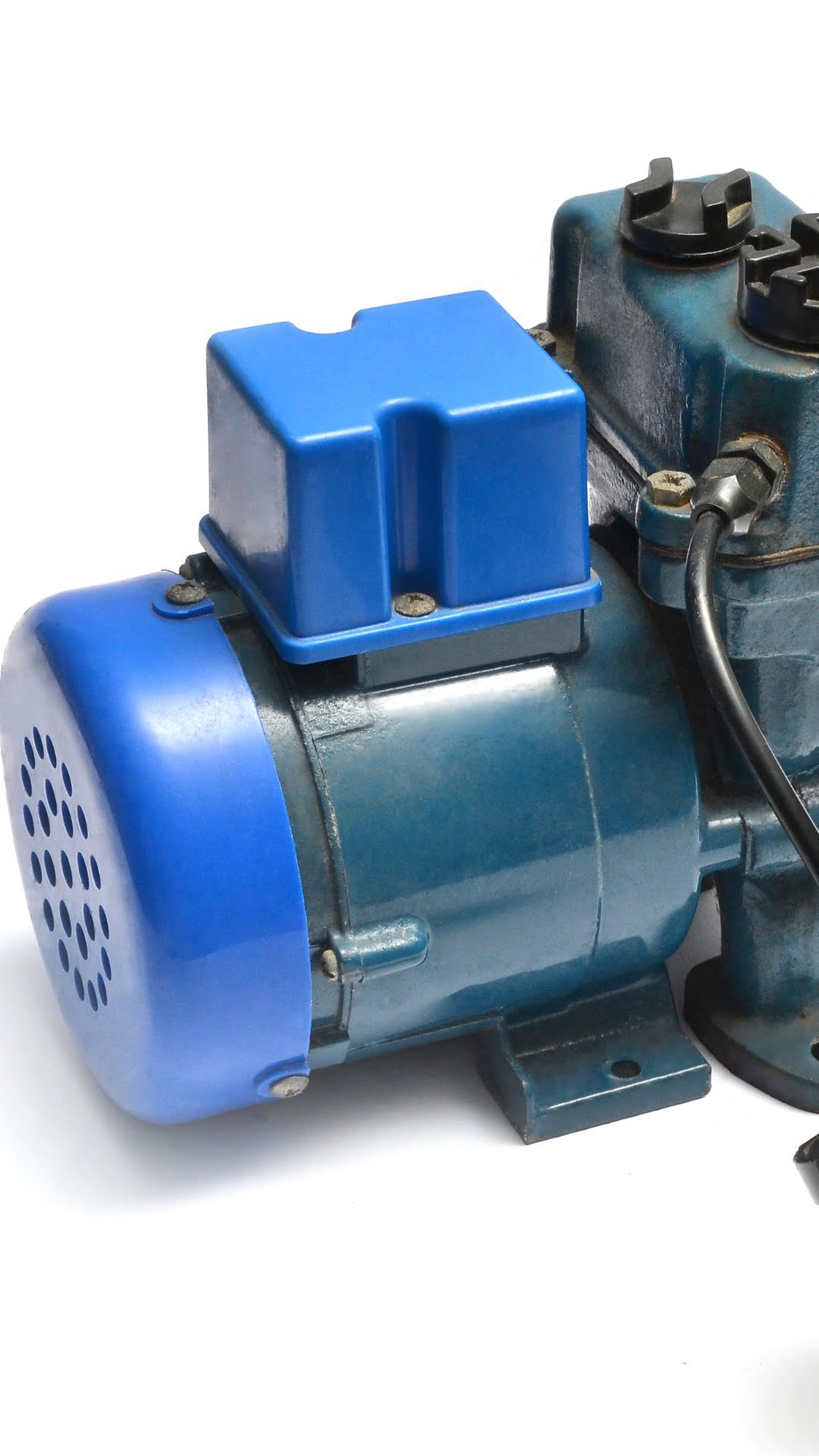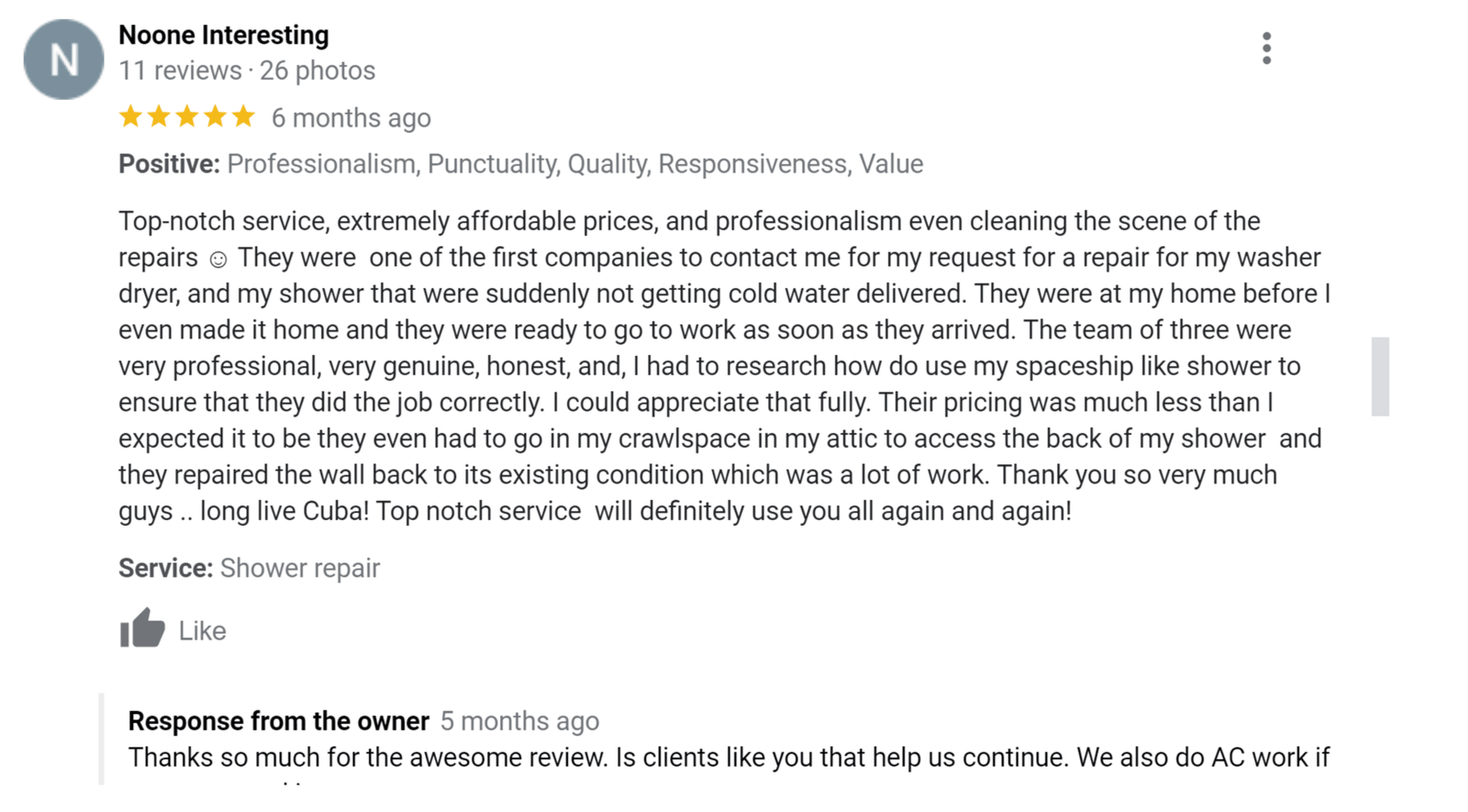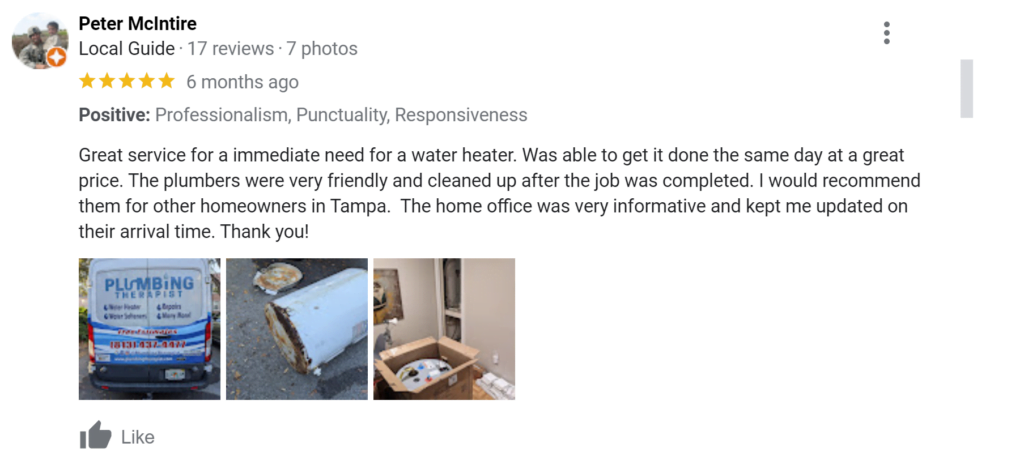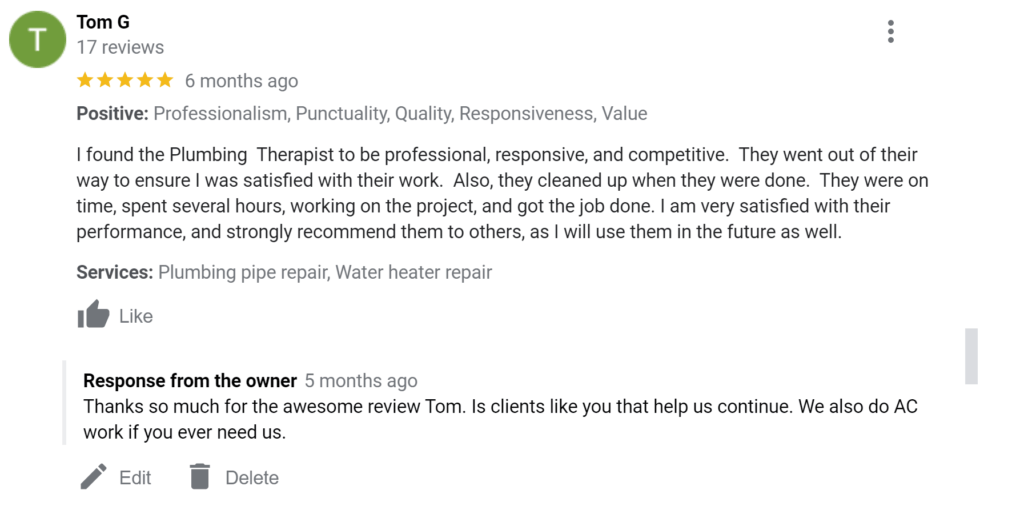Water Pump Replacement
Choose Plumbing Therapist for professional water pump replacement services in Tampa Bay. Expert, efficient solutions for your water system needs.
Do You Need Our Help ?
Feel free to contact us now
$99 Water Heater Flush + Free Plumbing System Inspection
Water Pump Replacement in Tampa Bay
Reliable Water Pump Replacement by Plumbing Therapist in Hillsborough County, Pinellas County, and Pasco County
At Plumbing Therapist, we understand the critical role water pumps play in your home or business in Tampa Bay. Our expert team specializes in providing top-notch water pump replacement services, ensuring your water system operates efficiently and reliably.
Why Choose Us for Your Water Pump Replacement?
- Expert Technicians: Our skilled professionals are trained in the latest techniques and use state-of-the-art tools to deliver exceptional service.
- Quality Assurance: We use only the highest quality pumps and materials, ensuring long-lasting and efficient operation.
- Customized Solutions: Every property is unique, and we provide tailored solutions to meet your specific water pump needs.
- Prompt and Efficient Service: We value your time. Our team works diligently to complete replacements quickly and effectively, minimizing disruptions.
- Local Experience: As a Tampa Bay-based company, we have a deep understanding of local plumbing needs and regulations.
Our Water Pump Replacement Process
- Assessment: We begin with a thorough evaluation of your current water pump system to determine the best course of action.
- Consultation: Our experts will discuss the findings with you, offering recommendations and a clear, transparent quote.
- Efficient Replacement: Once you approve, we proceed with the replacement, ensuring minimal downtime and disruption.
- Testing and Quality Check: After installation, we rigorously test the system to guarantee optimal performance.
- Customer Education: We believe in empowering our clients. Our team will guide you on maintaining your new water pump for longevity.
Comprehensive Water Pump Services
In addition to replacement, we offer a range of water pump services, including:
- Maintenance: Regular check-ups to ensure your pump’s efficiency and prevent future issues.
- Repairs: Quick and effective fixes for any pump-related problems.
- Installation: Professional installation services for new constructions or upgrades.
Contact Us Today
Ready for a water pump replacement or need more information? Contact Plumbing Therapist today at (813)-437-4477. Trust us to keep your water flowing smoothly in Tampa Bay!

Why partner with Plumbing Therapist?
Quality, Affordability, and Expertise.

No Hidden or Unexpected Charges

Free Estimates & Online Booking Available

Professionally Trained Technicians

Honesty is Guaranteed

Quick Communication & Service Within 24 Hours

400+ 5 Star Reviews

Why do you need to replace your water pump?
Replacing your water pump is essential for several reasons, particularly in maintaining the efficiency and reliability of your plumbing and water supply system. Here are key reasons why water pump replacement might be necessary:
Age and Wear: Over time, water pumps can suffer from wear and tear due to continuous use. An old pump is more likely to fail, potentially causing a disruption in your water supply.
Reduced Efficiency: As pumps age, they can become less efficient, consuming more energy to perform the same task. This inefficiency can lead to increased electricity bills and reduced water pressure.
Frequent Breakdowns: If you’re experiencing frequent breakdowns or the need for repairs, it might be more cost-effective in the long run to replace the pump rather than continually fixing it.
Noise and Vibration: Excessive noise or vibration from a pump is often a sign of internal problems. Replacing a noisy pump can prevent a complete breakdown and ensure quieter operation.
Rust or Corrosion: If the pump shows signs of rust or corrosion, its integrity is compromised. This can lead to water contamination and reduced pump life.
Upgraded System Requirements: If you’ve upgraded your plumbing system or added more fixtures, your existing pump might not be adequate to meet the increased demand. A new pump can ensure consistent water pressure and flow rate.
Water Quality Issues: A failing pump can affect water quality, leading to issues like sediment in your water or inconsistent temperature control.
Preventive Maintenance: Proactively replacing an aging pump can prevent unexpected failures and the inconvenience and potential damage they can cause.
Regular maintenance and timely replacement of your water pump ensure a reliable and efficient water supply, ultimately saving you time, money, and inconvenience.
If you would like more information, feel free to give them a call at (813)-437-4477 or you can book online and get their latest discount!
Customer Testimonials: Real Experiences with Plumbing Therapist
We proudly share the experiences and stories of our valued clients. Their feedback provides a glimpse into the quality of service and commitment to excellence we uphold at Plumbing Therapist. You'll read firsthand how our plumbing solutions have improved comfort and efficiency in homes across Tampa Bay. These testimonials illustrate our dedication to customer satisfaction and the difference our expert services can make.




Your questions answered
Common Water Pump Replacement Questions:
How long does a water pump last?
The lifespan of a water pump can vary significantly based on several factors, including the type of pump, the quality of the installation, the frequency and thoroughness of maintenance, and the conditions under which it operates. However, as a general guideline:
Residential Water Pumps: For typical home use, a well-maintained water pump can last anywhere from 8 to 15 years. Some high-quality models may last even longer, especially if they are properly serviced and not subjected to extreme conditions.
Factors Affecting Lifespan:
- Quality and Type of Pump: Higher quality pumps and certain types (such as submersible pumps for deep wells) often have a longer lifespan.
- Usage: The more a pump has to work (e.g., due to a large household or significant water usage), the more wear it experiences.
- Water Quality: Water with high levels of minerals or contaminants can cause more wear and tear.
- Maintenance: Regular maintenance, including checking and replacing parts like bearings and seals, can significantly extend a pump’s life.
- Installation: Proper installation by a professional is crucial to ensure that the pump operates within its intended parameters.
Commercial and Industrial Pumps: These can have varying lifespans depending on their design, usage, and maintenance. Some heavy-duty pumps in industrial settings are built to last for decades with proper care.
It’s important for homeowners to follow the manufacturer’s guidelines for maintenance and to be aware of signs of wear or failure, such as decreased water pressure, strange noises, or intermittent cycling. Regular maintenance and timely repairs can help ensure that a water pump lasts as long as possible.
Can I replace my water pump myself, or do I need a professional?
Whether you can replace a water pump yourself or should hire a professional depends on several factors including your skill level, the complexity of the pump system, and safety considerations. Here are some points to consider:
DIY Replacement:
Skill Level: If you have a good understanding of plumbing systems and are comfortable with tools, you might be able to replace simpler types of water pumps, like shallow well pumps or basic sump pumps.
Access and Simplicity: If the pump is easily accessible and the system is not overly complex, a skilled DIYer might manage the replacement.
Cost Savings: Doing it yourself can save on labor costs.
Learning Opportunity: It can be a valuable learning experience and provide a sense of accomplishment.
Hiring a Professional:
Complex Systems: For more complex systems, like deep well pumps or integrated HVAC systems, professional expertise is crucial.
Safety Concerns: Incorrect installation can lead to water damage, electrical hazards, or even personal injury. Professionals know how to handle these risks.
Tools and Equipment: Professionals have the right tools and equipment for the job, which many homeowners do not.
Warranty and Compliance: Professional installation often comes with a warranty. Also, professionals are aware of local codes and regulations, ensuring that your installation is compliant.
Time and Convenience: A professional can typically complete the job more quickly and with less hassle for the homeowner.
Troubleshooting: If there are issues with the system, professionals are better equipped to diagnose and resolve them.
How long does it take to replace a water pump?
The time it takes to replace a water pump can vary widely depending on several factors, including the type of pump, the complexity of the system, accessibility, and whether any additional repairs or modifications are needed. Here’s a general breakdown:
Simple Pumps (e.g., Sump Pumps, Shallow Well Pumps): For more straightforward installations, such as a sump pump or a basic shallow well pump, the replacement can often be completed within 2 to 4 hours. This assumes easy access and no major complications.
Complex Systems (e.g., Deep Well Pumps, Integrated Systems): For more complex systems, such as deep well pumps or pumps that are part of an integrated plumbing and heating system, the replacement could take a full day or possibly longer. These systems often require careful disassembly, installation, and testing to ensure proper function.
Accessibility: If the pump is difficult to access, such as being located deep underground or in a cramped space, this can add significant time to the project.
Additional Repairs or Modifications: If during the replacement process, it’s discovered that there are other issues (like piping repairs, electrical work, or system upgrades), this can extend the timeline.
Professional vs. DIY: A professional plumber or technician can usually complete the job more quickly due to their experience and specialized tools. A DIY approach might take longer, especially if it’s a learning process for the homeowner.
Preparation and Cleanup: Don’t forget to factor in time for setting up the work area and cleaning up afterward. This is especially important in professional settings where the work area needs to be left clean and tidy.
In summary, while a simple pump replacement might be a matter of a few hours, more complex situations could require a full day or more, especially if unexpected issues arise. It’s always a good idea to discuss the time frame with a professional beforehand, so you have a clear expectation of how long the work will take.
What type of water pump do I need for my home?
Choosing the right type of water pump for your home depends on several factors including your water source, the size of your home, your water usage needs, and specific features of your property. Here are some common types of water pumps and their typical applications:
Shallow Well Pumps: If you have a shallow well (less than 25 feet deep), a shallow well pump is suitable. These are often used in rural areas where municipal water is not available.
Deep Well Pumps: For wells deeper than 25 feet, a deep well pump is necessary. There are two main types: submersible pumps, which are placed inside the well, and jet pumps, which are installed above ground.
Sump Pumps: If your home is prone to basement flooding or is in a low-lying area, a sump pump is essential. It removes water that accumulates in a sump basin, typically located in the basement.
Booster Pumps: If you experience low water pressure in your home, a booster pump can increase the pressure. This is particularly useful in multi-story homes or properties on higher ground.
Utility Pumps: For general water transfer or removal needs, such as draining a pool, powering a sprinkler system, or in emergency situations like flooding, a utility pump is useful.
Sewage/Effluent Pumps: These are used for pumping waste or sewage. They are necessary if your home has a septic system or is located below the main sewer line.
Factors to Consider:
- Flow Rate: This is the speed at which water is pumped and is measured in gallons per minute (GPM). Your household size and water usage will determine the required flow rate.
- Horsepower: The power of the pump affects its ability to move water efficiently. Higher horsepower is needed for larger homes, higher water usage, or greater distances.
- Head Pressure: This refers to the pump’s ability to move water to a certain height. Consider the elevation and distance from the water source.
- Water Quality: If your water contains sand or other particulates, you’ll need a pump that can handle this without clogging or damage.
- Energy Efficiency: Some pumps are more energy-efficient than others, which can be a consideration for reducing electricity costs.
Given the variety of factors involved, it’s often beneficial to consult with a professional, like a plumber or a water system expert, to determine the most appropriate type of pump for your specific needs. They can assess your home’s water system and recommend a pump that meets your requirements for performance, efficiency, and budget.
Is a new water pump more energy-efficient?
Yes, a new water pump can often be more energy-efficient compared to an older model, for several reasons:
Advanced Technology: Newer pumps are typically designed with the latest technology, which often focuses on energy efficiency. They may use less energy to perform the same tasks as older pumps.
Improved Design: Modern pumps often have better design features, such as more efficient motors, improved impellers, and optimized flow paths, which reduce energy consumption.
Variable Speed Motors: Some newer models come with variable speed motors, which adjust the speed of the pump based on demand. This can significantly reduce energy usage compared to older, single-speed pumps.
Better Materials: The materials used in newer pumps might be lighter and more durable, reducing the energy required for operation and increasing the lifespan of the pump.
Reduced Wear and Tear: An older pump may have suffered wear and tear that makes it work harder and less efficiently. A new pump operates at its peak efficiency.
Energy Star Ratings: Some modern water pumps come with Energy Star ratings, indicating they meet certain energy efficiency criteria set by the U.S. Environmental Protection Agency (EPA).
Customization and Sizing: New pumps can be more precisely sized for your specific needs. An oversized or undersized pump in an older system can lead to inefficiencies, whereas a correctly sized new pump can operate more efficiently.
Smart Features: Some new pumps include smart features that allow for better monitoring and control, which can lead to more efficient operation and energy usage.
While a new pump can offer energy savings, it’s important to balance the upfront cost of the pump and installation against the potential energy savings over time. Consulting with a professional can help determine if a new, more energy-efficient pump is a cost-effective choice for your specific situation.
What is involved in the maintenance of a new water pump?
Maintaining a new water pump is crucial for ensuring its longevity, efficiency, and reliability. Regular maintenance can prevent breakdowns and costly repairs. Here’s a general guide to what is typically involved in the maintenance of a new water pump:
Regular Inspection: Schedule regular inspections of the pump and its components. Look for signs of wear, leaks, corrosion, or unusual noises. Check for loose fittings or connections and ensure that the pump is securely mounted.
Cleaning: Keep the pump and surrounding area clean. Remove any debris, dirt, or sediment that may have accumulated around the pump. This is especially important for sump pumps, where debris can easily accumulate in the sump pit.
Lubrication: Some pumps require regular lubrication of bearings and other moving parts. Always use the type of lubricant recommended by the manufacturer.
Checking Seals and Gaskets: Over time, seals and gaskets can wear out and may need to be replaced to prevent leaks. Inspect these components regularly and replace them as needed.
Monitoring Performance: Pay attention to the pump’s performance. Changes in pressure, flow rate, or energy consumption can indicate potential problems.
Electrical Components: Check electrical connections and components for signs of wear or damage. Ensure that the wiring is intact and that there are no exposed or frayed wires.
Pressure Tank Maintenance: If your water pump system includes a pressure tank, it should be checked to ensure that the pressure is within the recommended range. The air pressure in the tank should be checked at least annually.
Winterizing: If applicable, take steps to protect your pump from freezing temperatures. This might include draining the pump or insulating pump components.
Professional Servicing: Have a professional service the pump periodically. They can perform more complex maintenance tasks and check for issues that might not be apparent to the untrained eye.
Following Manufacturer’s Guidelines: Always refer to the manufacturer’s manual for specific maintenance recommendations for your particular model of pump.
Record Keeping: Keep a record of all maintenance activities, repairs, and replacements. This can be helpful for troubleshooting future problems and for warranty purposes.
Regular maintenance not only prolongs the life of the pump but also ensures that it operates efficiently, saving you money on energy costs and preventing unexpected failures. If you’re unsure about any aspect of maintenance, it’s always best to consult with a professional.

